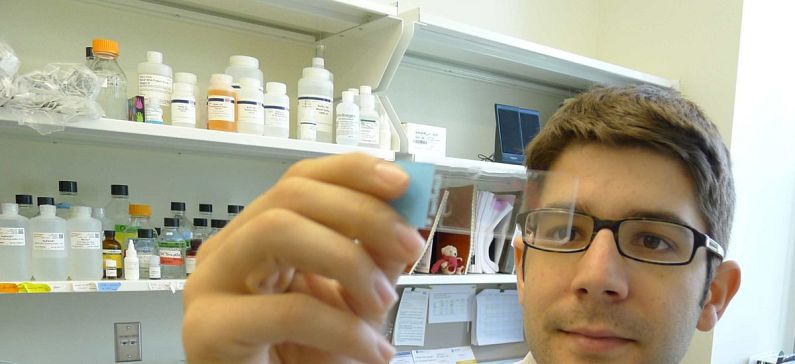
Distinguished scientist in the fight against cancer
Thales Papagiannakopoulos is an Assistant Professor of Biology at the New York University School of Medicine and a PostDoc at Koch Institute at MIT. The research team in which he participates at Dana-Farber Cancer Institute, the Massachusetts Institute of Technology, and other institutions have discovered a sign of the early development of pancreatic cancer, an upsurge in certain amino acids that occurs before the disease is diagnosed and symptoms appear. Thales is a biologist at the Koch Institute for Integrative Cancer Research of MIT.
The research was published by the journal Nature Medicine and Thales was honored for his contribution by the Academy of Athens, when they presented him with a special prize on December 22, 2015. Although the increase isn’t large enough to be the basis of a new test for early detection of the disease, the findings will help researchers better understand how pancreatic cancer affects the rest of the body, particularly how it can trigger the sometimes deadly muscle-wasting disease known as cachexia.
The researchers used blood samples collected years earlier from 1,500 people participating in large health-tracking studies. They analyzed the samples for more than 100 different metabolites – substances produced by the metabolic process – and compared the results from participants who had gone on to develop pancreatic cancer and those who had not.
“We found that higher levels of branched chain amino acids were present in people who went on to develop pancreatic cancer compared to those who did not develop the disease,” Wolpin said. (Branched chain amino acids are one family of amino acids, the building blocks of proteins.) The amount of time that would elapse before those individuals were diagnosed with pancreatic cancer ranged from two to 25 years, although the highest risk was in the several years before diagnosis, the researchers found. “These findings led us to hypothesize that the increase in branched chain amino acids is due to the presence of an early pancreatic tumor,” Wolpin remarked. This theory was confirmed in laboratory experiments performed by Vander Heiden’s group at the Koch Institute for Integrative Cancer Research at MIT. Their experiments showed that mice with newly formed pancreatic tumors had above-normal blood levels of these amino acids.
As far as his curriculum vitae is concerned, Thales got his Bachelor in Science (Molecular Genetics) in the University of Sussex, in 2004, and his Ph.D. In Molecular, Cellular and Developmental Biology in the University of California in Santa Barbara (2010). He was a summer intern at the Scripps Research Institute and from there he became a Research Assistant at the same institute. He is now a PostDoc at the MIT Tyler Jacks Lab and currently an Assistant Professor in the New York University.
Read also:











